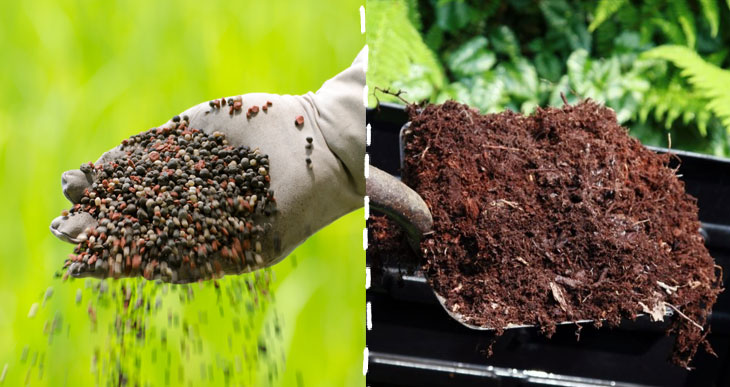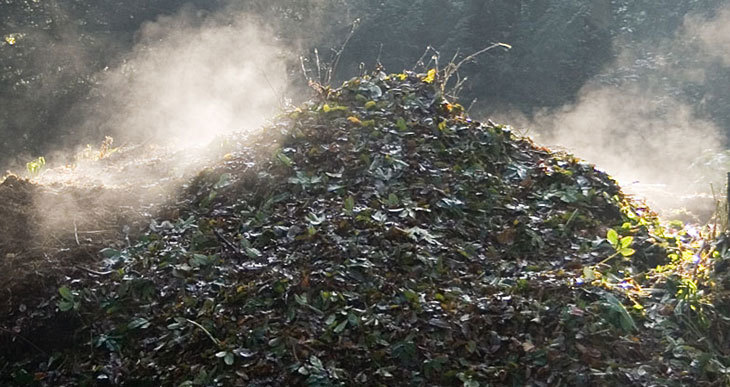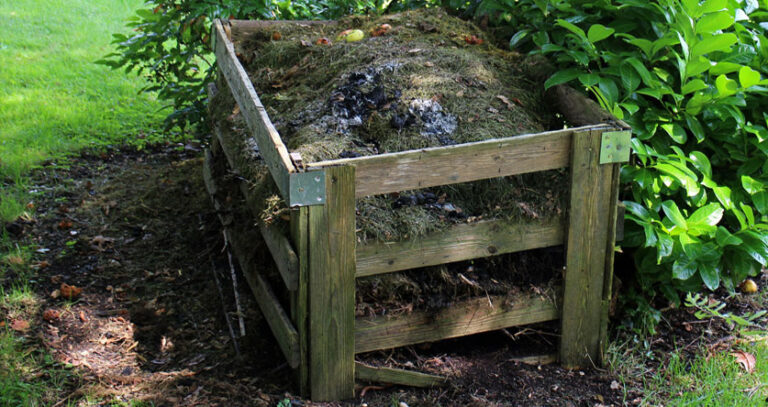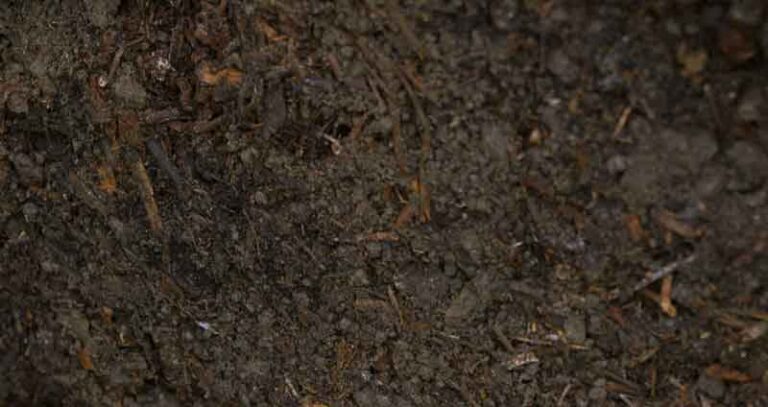Compost pH – The Role of pH Levels in Composting
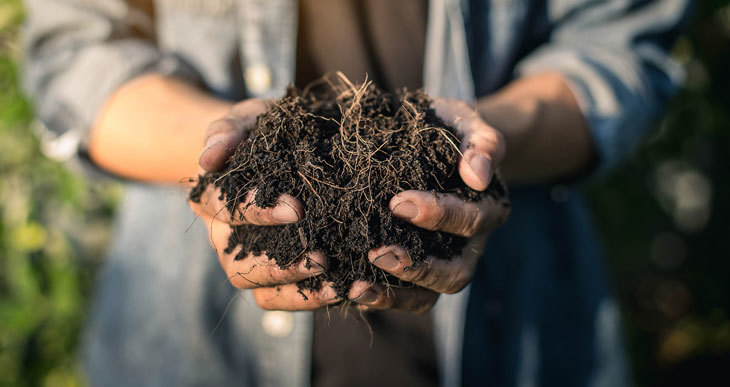
As a keen gardener you probably already understand the importance of knowing the pH of your soil. But what about the pH of your compost? How does the pH of compost affect the plants you grow?
After all, if the pH of your soil is too high or too low, it can literally kill your plants! A basic understanding of the role of pH levels in compost can help avoid mistakes, and help you make better compost to suit the needs of your own particular backyard soil conditions.
So what is the role of pH in composting? Mature compost generally has a pH of between 6 and 8. As compost decays it goes through a cycle of varying pH levels. It usually begins quite acidic, but over time the composting materials become more neutral. If the soil in your yard is slightly alkaline or acidic, you can try to modify your compost’s pH level to counterbalance and amend your soil.
Different plants like different soil conditions, but the majority thrive in a neutral pH of around 7. If you don’t want to poison your garden plants, a good understanding of compost acidity and alkalinity can help. This may in turn help you amend and tweek your compost if necessary.
Here’s a quick explanation…
Finished Compost pH
Most finished compost tends to be fairly neutral. It varies between slightly acidic or slightly alkaline. Mature compost is said to have a pH of between 6 and 8.
pH is a measure of the relative acidity (sourness) or alkalinity (sweetness) and is expressed on a scale from 1 to 14. Low values are acid, whereas high values are alkaline (or basic). A pH level of 7 is neutral.
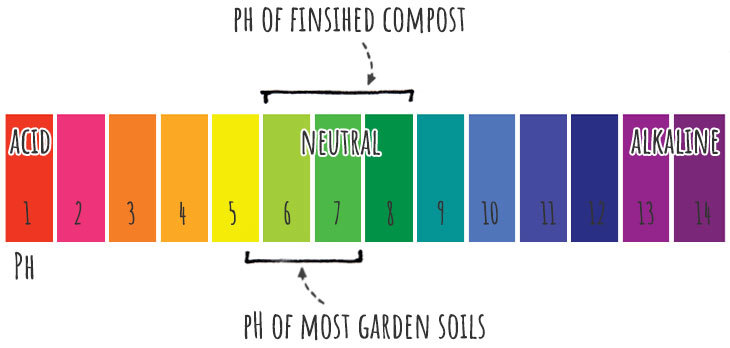
Most plants thrive in soil conditions that have a neutral pH. So the general aim with composting is to produce a finished product which also has a fairly neutral pH. A good mix of varied materials and a well aerated compost bin will naturally produce neutral pH compost. But if things go astray, there are a few things you can do to fix the problem.
pH Values in Compost
The decomposition of organic matter in a compost pile is mostly achieved by the work microorganisms such as bacteria and fungi. A compost heap is teaming with life, all working hard to break down the raw materials and release the nutrients from organic matter.
The bacteria and fungi that are so important to this process are most efficient at neutral pH levels of between 6 and 7(Although fungi can be optimal at a larger range of pH levels between 5..5 and 8).
This microbial process happens in stages, and at different times during decomposition, the pH will vary.
In the early stages, low temperature bacteria (psychrophiles) begin digesting organic matter and produce amino acids. If you were to do a pH test in the first couple of weeks you would find that your compost is acidic.
As the temperature of the pile increases, other bacteria (mesophiles) take over, and the composting material eventually neutralizes.
These bacteria are what’s known as “aerobic”, meaning that they need oxygen to survive. In order for these microbes to do their job efficiently and neutralize the compost’s pH level, the pile needs to be well oxygenated. Otherwise another type of bacteria takes over. Known as “anaerobic” bacteria , these little critters don’t need air to survive, but they contribute to the buildup of organic acids, and lower the pH of the resulting compost.
The final pH of the compost is also dependant on the type of material you throw in your bin. Certain organic substances in larger quantities can affect the acidity or alkalinity of the finished compost.
How to Test Compost pH
You can test the pH of your compost at regular intervals, but keep in mind that the results will vary.
In the first place, your pile will not have the same pH value in all parts of the compost. Different areas will be at different temperatures and in different stages of decomposition.
One solution is to take samples from various places within the pile then mix them to get an average pH reading.
There are a couple of options for testing pH levels in compost. You can measure the pH using a soil pH meter. These have prongs which are useful for inserting deep into the pile.
- Electronic soil meters like this one on Amazon are quick and easy to use.
For more accurate results you can send a sample to a laboratory to have it analyzed.
- This simple laboratory test kit sends you the results by mail or email within a week and includes an extensive report.
If your compost is very dry it may be tricky to get a pH reading using a soil meter. You can get around this by mixing the compost with some distilled water. To compare your readings over time, just be sure to use the same proportions of compost to water for all your measurements.
But probably the best indication of how your compost is amending your soil is to do a test after you’ve added it to your backyard.
The Effects of Compost on Soil pH
Something to keep in mind about compost is the beneficial effects it naturally has on your soil’s pH levels. Compost has the amazing ability to balance pH values. If your soil is too acidic, compost will naturally raise the pH level. Soil too alkaline? By adding compost the pH level of the soil lowers.
Your compost will also protect your soil from abrupt changes in pH levels. It essentially acts as a “buffer”.
How to Lower Compost pH – Make it More Acidic
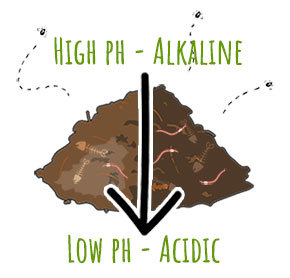
You can make your compost more acidic by using a larger proportion of acidic materials in the first place. Large quantities of pine needles or oak leaves will probably lower your compost’s pH to a slightly acidic level. Making compost of this kind is often referred to as ericaceous compost(ericaceous means suitable for lime-hating/ acid-loving plants).
You can also adjust compost pH levels just after you use fresh compost in your soil. This provides a reliable method to know what kind of adjustment to make. If you still need to improve the acidity (lower the soil’s pH) you can add an amendment such as aluminium sulphate (Amazon link).
Anaerobic composting is a way of producing very acidic compost. Remember those oxygen-hating microbes we talked about earlier? This method exploits those anaerobic bacteria by sealing compostable materials in an environment without any air. This technique is used in various methods such as trench composting, bag composting, and garbage can composting. However, it should be noted that fresh anaerobic compost is very acidic – it needs to be exposed to air for about a month to neutralize the pH or it can damage your plants.
How to Raise Compost pH – Make it more Alkaline
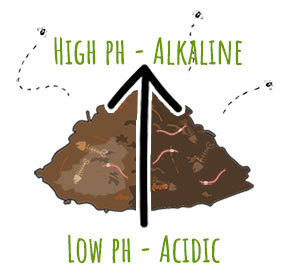
Turning the compost to aerate and improve air circulation will help reduce acidity. This is because in the early stages of decomposition the composting bacteria release organic acids. These are great for breaking down some of the more difficult “brown” feedstocks like branches and twigs and they also encourage fungi growth.
However, if oxygen levels are low because of poor air flow, the organic acids can build. Turning and mixing your pile often reduces acidity. Also make sure the pile has enough coarse “brown” materials for good aeration.
Adding wood ashes to compost is also said to help neutralize the mix. Ashes are more alkaline in nature and are also a good source of potassium (one of the essential nutrients for growing plants). You can add several layers of ashes roughly every 18 inches.
I’ve heard that some gardeners like to add limestone to raise the pH of acidic compost.
However, lime is actually not a great additive to put directly in the compost because it causes the release of ammonium nitrogen gas. It is preferable to keep the nitrogen content in your compost for use by your plants. Nitrogen is another essential nutrient for good plant growth.
Again, if you want to use lime, then add it to the soil after you apply your compost. You can use an amendment such as organic garden lime (Amazon link). You can add a thin layer then cover it with soil and compost so it raises the pH over time.
Final Thoughts about Compost and Soil pH
Don’t get too hung up about making perfect compost!
Whatever type of compost you use, it tends to have a beneficial neutralizing effect, moving the soil pH closer to neutral. So whether your soil is acidic or alkaline, compost is a safe way to manage problems and help amend your soil.




